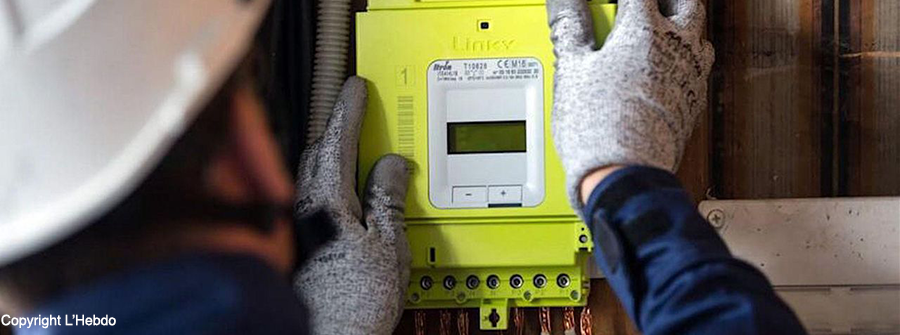
The essential guide for understanding your energy bill!
Electricity and gas: invoice 14 June 2023 • 1 Reaction • 10 minutes
Published by Mathilde Lepage

Understanding your electricity and gas bill is essential! Why? For the very good reason that it represents a significant part of your budget, and can sometimes be wrong.
Contents
- How is a gas or electricity bill divided up?
- How are the costs broken down in an average energy bill?
- Understanding the three types of energy bill in Belgium
- What does an electricity or gas bill have to include?
- Example of an annual energy bill
- How can I pay my electricity or gas bill?
- How can I estimate my electricity or gas bill?
- The secrets to reducing your energy bill
- How can I dispute a gas or electricity bill?
Having to take out your wallet is rarely a pleasure, especially when it’s for a large amount. However, understanding where the amount comes from can make it easier to swallow. Have you ever wondered who sets the price of a kilowatt-hour of electricity or natural gas? Which players in the energy market do the different costs listed on your energy bill depend on? Energyprice.be reveals all the secrets of your bill!
How is a gas or electricity bill divided up?
An energy bill consists of three main components:
- the energy price;
- the network costs, i.e. the costs of distribution and transport;
- taxes and surcharges.
1. The energy price
The first part of the bill is the only area where consumers have any influence. It contains the price per kWh of gas or electricity and the fee (a kind of annual subscription), both of which are set by the energy supplier (Engie, TotalEnergies, etc.). For electricity, the supplier bills a third component due to its obligation to buy green and cogeneration certificates. This is the renewable energy contribution and, where relevant, the cogeneration contribution (only in Flanders).
Remember, the liberalisation of the market introduced competition between different suppliers and enabled consumers to become customers of their chosen supply companies.
2. Network costs
Network costs encompass the expenses associated with transporting and distributing energy.
High-voltage electricity transfer is managed by Elia, while high-pressure gas transport is provided by Fluxys. The distribution system operators (DSOs) then take over, routing the energy to individual households via the medium- and low-voltage/pressure network. It’s easy in Brussels, because there’s only one: Sibelga. The best-known in Wallonia is probably ORES, and in Flanders it is Fluvius.
The network fees, controlled by the CREG (the federal regulator), thus do not depend on the supplier. The supplier prepares your gas and electricity bill and collects the payments, but it then passes on the relevant share to each player involved.
3. Taxes and surcharges
The final section of the bill contains VAT and other taxes imposed by the federal and regional authorities. These include the energy contribution and the federal contribution.
Get more tips for your energy consumption! Subscribe today to the newsletter.
How are the costs broken down in an average energy bill?
An energy bill consists of several sections with varying levels of impact on the total amount. According to CREG figures, the energy itself accounts for the biggest part of household energy budgets in Brussels since the government lowered the VAT to 6%, a measure at first temporary which became permanent starting 1 April 2023.
Natural gas enables consumers to make greater savings, because the energy cost represents an even higher proportion of the bill since the support measures have been introduced. This means that switching gas supplier to benefit from the cheapest energy tariffs is often a good idea.

What is the most important information in a gas or electricity bill? As a consumer, there’s no point focusing on the total amount of your energy bill. There is unfortunately nothing you can do about the transport and distribution costs or the taxes. Concentrate instead on the price of the electricity or gas! This is where you can take control and refuse to keep paying too much, when other suppliers offer lower rates for the same service. Of course you should also keep an eye on your electricity and gas consumption, because the cheapest energy of all is the energy you don’t use.
If you are reluctant to cancel your current energy contract through fear of being disappointed with the services of a new electricity or gas supplier, don’t worry. We are here to advise you and present each company’s strengths. Interested? Call us free of charge on 0800 37 456 from Monday to Friday between 9 am and 12.30 pm or 1.30 and 5.30 pm.
Understanding the three types of energy bills in Belgium
Consumers in our country can receive three different types of bills:
- instalment bills, also known as intermediate bills, which spread the payment of your annual gas or electricity consumption over the whole year. Generally issued monthly, they can also be bimonthly or quarterly at the customer’s request. Note that the amount of your instalment bill is determined based on an estimate of your future consumption, and can be adjusted at any time through your customer account.
- the adjustment bill, also known as the annual bill or annual statement. This is issued every year by the energy supplier based on readings from your electricity or gas meters. The readings may have been taken by your DSO or submitted by you. Depending on the amount of the instalments paid during the year and your actual energy consumption, you will either pay the remaining balance or receive a refund of any excess payments.
- the closing bill: this is issued at the end of a consumption period, such as when you move house or change your energy supplier or package.
What does an electricity or gas bill have to include?
To ensure energy bills are reasonably transparent, the law requires suppliers to include several specific details. For example, they must contain the following information:
| Required information | Intermediate accounts | Annual bill | Closing bill |
|---|---|---|---|
| The duration of the electricity or gas supply contract | √ | √ | √ |
| The period of consumption covered by the bill | √ | √ | √ |
| The name of the package or service | √ | √ | √ |
| The amounts billed | √ | √ | √ |
| De EAN-code (nummer beginnend met 54) | √ | √ | √ |
| The meter number (consisting of 8 digits) | √ | √ | √ |
| The contact details of the supplier’s customer service department | √ | √ | √ |
| The contact details of the energy mediation service | √ | √ | √ |
| The notice period for cancelling without incurring charges | √ | √ | √ |
| The readings at the start and end of the period | × | √ | √ |
| The number of kWh of gas or electricity consumed | × | √ | √ |
| Details of how the amount to pay is calculated | × | √ | √ |
| The evolution of the customer’s energy consumption, the price per kWh and the total bill amount over the last three years | × | √ | √ |
| The transport and distribution costs and the taxes charged by the public authorities | × | √ | √ |
| The origin of the electricity sold by the supplier | × | √ | √ |
Any questions about the information on an electricity or gas bill? Don’t hesitate to ask us by calling 0800 37 456 or by e-mail (info@energyprice.be). Our advisers will answer as accurately as possible to help you understand your energy bill.
Example of an annual energy bill
Reading a gas or electricity bill can sometimes be complicated, especially an annual statement. How is the amount calculated? What is your new instalment amount based on? When does an adjustment bill result in a credit note (an amount credited in your favour)? Find all the answers in this (French) video from Luminus!
https://www.youtube.com/watch?v=7lRIt8QlCz0
How can I pay my electricity or gas bill?
The suppliers in the Belgian market usually offer their customers several ways of paying their energy bills. These include direct debit (automatic payment), bank transfer and Zoomit, which is free and accessible from your online banking service. Some suppliers, such as Eneco, also accept credit cards (Visa, MasterCard or American Express).
Note that some electricity or gas packages do not offer you a choice of payment method. Online packages, for example, are frequently combined with direct debit and also require electronic billing. If you want paper bills, you can ask for the paper option.
Perhaps you’re wondering when your gas or electricity bill will arrive? The billing frequency depends on your preferences! Most suppliers offer a choice of monthly, bimonthly or quarterly bills. A few even allow six-monthly payments or an immediate down-payment for a year’s energy. This last option is available from Luminus, for example. How you manage your energy budget is up to you.
How can I estimate my electricity or gas bill?
The simplest way of estimating your electricity or gas bill is to read your meter at regular intervals. If you read the meter every month for three months, for example, multiply the number of kilowatt-hours by four to find your annual consumption. Then multiply this figure by the price per kWh indicated in your supply contract. Don’t forget to add the annual fee and the renewable energy charges for electricity to find the final amount.
Did you know? Reading your meter over a short period will only give you an estimate of your energy consumption. If your heating is powered by electricity or natural gas, you will obviously use more energy in winter. If you base your calculation on data collected in summer, you will have to increase your number of kWh.
The secrets to reducing your energy bill
Being able to read your energy bill properly is an essential prerequisite for the next step: bringing it down! It involves analysing the energy price and your consumption of electricity or gas. Only logical – these two figures directly influence your bill amount.
“My electricity bill has gone up!”, “My gas bill has doubled!”… These are commonly heard complaints, but don’t panic, there are two solutions: use less electricity or gas and sign up to a more competitive gas or electricity contract. The secret to the first solution is to get rid of all your bad habits and invest in economical equipment. For the second, just compare the cost of electricity and gas using our CREG-certified online tool. You can find the cheapest energy tariff and/or greenest deals and suppliers in barely a minute.
Do you find reading your electricity or gas bill difficult? Do you want help comparing prices or simulating your gas or electricity consumption? Don’t move: our energy advisers are here for you! If you need their help, call them on 0800 37 456 from Monday to Friday between 9 am and 12.30 pm or 1.30 and 5.30 pm.
How can I dispute a gas or electricity bill?
We strongly recommend checking your gas and electricity bills, because mistakes can happen. In fact, the chances are greater with adjustment or closing bills.
Of course, before disputing an amount or a figure, the first requirement is to understand the content of your energy bill. You already do? Great – the next step is to carry out a few checks. The first is the calculation of your gas or electricity consumption. Make sure the readings on your adjustment bill match the figures you read on your meter. Next, check that the energy price quoted by the supplier is the one stated in your contract.
Have you found a billing mistake? Contact your supplier’s customer service department, or, for meter issues, talk to your DSO. Remember, your supplier has to give you an answer within 10 working days. If they fail to do so, or don’t suggest a satisfactory solution, you can contact their complaints department. If this still doesn’t solve your problem, there is one more solution: apply to the federal mediator or the regional mediator. In Wallonia, the regional mediator is an office of CWaPE.
Does your estimated gas or electricity bill look wrong? Do you want an outside opinion? If you like, you can contact our advisers by phone on 0800 37 456 or by e-mail. They will take the time to examine the situation with you.
Also read on our blog

By 2020, gas and electricity prices for kWh had not resisted the health crisis and had collapsed. But at the beginning of 2021, th…

In July 2018, the Walloon and Brussels Parliaments voted in favor of installing smart meters – also known as communicating m…

The news broke this morning: oil giant Total (which had already turned heads by buying the Liège-based 100% green energy company L…



